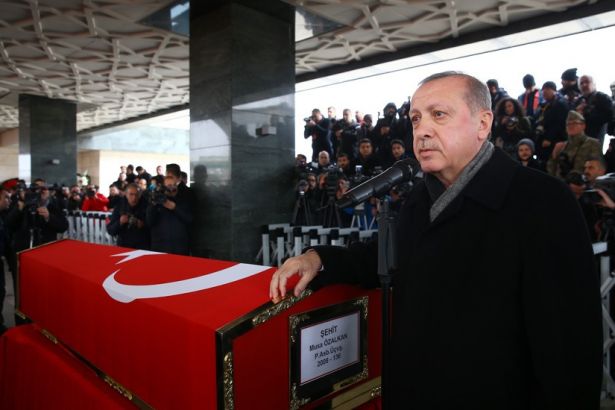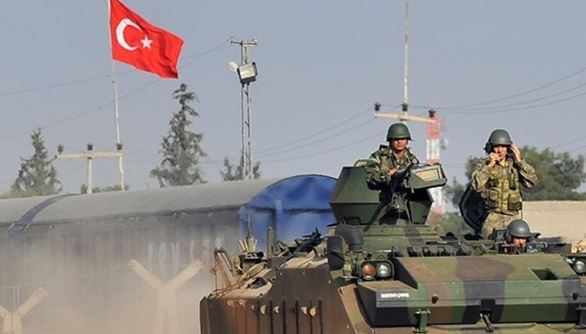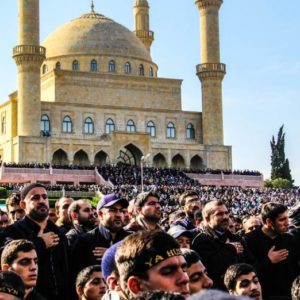Like a typical adolescent, bent on asserting his phallic worth through projecting raw force right and left – thereby creating a constant scene – Turkey would remain interesting as a site of constant political and economic drama or tragedy, depending on who you are, for the foreseeable future.
Already, the year 2018, has started with Turkish military operation code-named “Operation Olive Branch” into the Syrian Kurdish People’s Protection Units (YPG) controlled Afrin province Northern Syria. The vociferous disagreements that began with the United States in the end of last year over a wide-ranging issues as the Reza Zarrab and Mehmet Hakan Atilla court case in the United States; the impasse over the rendition of Fetullah Gulen; the case of imprisoned American pastor in Turkey; Turkey’s agreement with Russia to buy a 2.5-billion worth S-400 air defense missile systems; and the US support of the YPG have not so far found resolution. In the hyped race in the Red Sea, Turkey is actively projecting its military and economic presence in Somalia and Sudan.
On the domestic front, the ruling AKP has not let up its witch-hunt against its political nemeses and it has struck an alliance agreement with the Nationalist Movement Party (MHP) in a bid to secure its domination over the parliament in the next election. Overall, all is not quite on the Turkish front. As hard as it is to make any kind of prognostication about Turkey, it is worth sketching a general picture of the geopolitical, economic, and political probabilities depending, like fortune tellers, on extant sings on the ground.
On the geopolitical front, Turkey’s success rate is checkered and will likely be so in the rest of 2018. Relations with the West is still rocky and chances are that they will continue without significant breakthrough with all outstanding issues lingering to the future. However, Turkey has been diversifying its geopolitical alliances and it is getting some dividends out of it. One somewhat fruitful alliance is the one it has so far maintained with Russia. A concrete instantiation that this is bearing fruit for the country is the 2.5 billion credit agreement on the purchase of S-400 air defense missile systems from Russia that both countries signed in December 2017.[1]The anti-aircraft system is capable of shooting down aerodynamic targets at a “range of up to 400 km and ballistic missiles up to 60 km away.”[2] The system is far more advanced than the US Patriot system and it is described as a game-changer in the Middle East. This will enormously improve Turkey’s military leverage in the region even though it has already drawn the ire of the United States and other NATO members.

In the Syrian theatre, where villains and heroes constantly trade places and alliances shift in a dizzying speed, Turkey’s rapprochement with Russia helped it to re-enter into the stage without being openly accused of aiding and abetting extreme Islamist groups. It has somehow relegated its avowed desire to oust Assad from power and has settled with containing the power of the Kurdish forces roaming in Northern Syria. In November 2017, Russia, Iran and Turkey met in Sochi and agreed to work to effect peace in Syria through concessions and compromises.[3] The Sochi summits and subsequent meetings show that Turkey is settling for a more pragmatic and modest goal in Syria now. It is clear that its horses in the race are not winning and Assad has emerged defiantly stronger. Now, Turkey’s objective is limited to keep the Kurdish menace at bay. However, as its recent military operation into the Kurdish controlled Afrin province shows, securing Turkey’s strategic interest in Syria won’t be a walk in a park. The military operation has already faced problems, drawn disapproval from Moscow and Tehran, brought the country on a collision course with the United States, and provoked a tactical rapprochement between the Syrian government and the Kurdish forces in Northern Syria.[4] The Syrian theatre is saturated by great powers with conflicting purposes. In light of that, it is not going to be possible for Turkey to realize its strategic interests no matter what are the different measures tries. The best it could hope for, and that is by remaining close to the Russian/Iranian camp, is to check the overflow of the Kurdish power to its territories. The populist mood in Ankara suggests that the country will persist on blindly charging into Syria until it hits the wall.
Turkey is betting its bottom dollar in the scramble for influence in the Red Sea by building strong military and economic ties with Sudan and Somalia. It has been helping the latter to reconstitute itself through training of military personnel, and building mega infrastructures like airports and hospitals.[5] It upped its geostrategic game by allegedly agreeing with Sudan to build a military base in the ancient port city of Suakin – after a massive 650 million USD reconstructing programs that is hoped to be bankrolled by Qatar.[6] Turkey also plans to build a new airport in Khartoum, invest in cotton production, electricity, and grain storages. Both countries have agreed to boost bilateral trade to 10 billion dollars.[7] The Turkish Sudanese agreement has already ruffled some feathers in Cairo and Jeddah. Egypt is carefully watching the development in light of Ankara’s strong support of the ousted Egyptian Muslim Brotherhood and its increasing friction with Sudan over border issues. The Saudis also do not like a Tehran-friendly Ankara to set foot in a place roughly 261 nautical miles away from Jeddah. Two things are expected from this overstretch of Turkey’s power: One, it will provide Turkey some tactical leverage in its dealings in the Middle East; Two; in the long run the windfall gains to be acquired by over-stretching of its power will be minimal if not counterproductive. Turkey might need to realize that it is biting off more than it can chew.
Like its foreign policies and dealings, all is not quiet and well on the domestic front. The military aggression abroad and combative foreign policy approach is logically matched by the increasing narrowing of the free political space in the country with populist demagogy justifying the act. Erdogan has been unforgiving of his political opponents and the clampdown against dissidents and the free media is continuing unabated. Erdogan’s fury has not sparred some of the top dogs of his own party. Charging them with ‘fatigue’, he forced – using intimidation and blackmail – six senior mayors, like the colorfully controversial mayor of Ankara, to resign.[8] To ensure future dominance and avert any danger of losing the majority position in the parliament, the AKP has struck an alliance with the Nationalist Movement Party (MHP).[9] Erdogan needs as many votes as possible to get elected as the executive President in 2019, which requires over 50 percent vote. The MHP also needs to secure more than 10 percent votes to enter parliament. As both the AKP and the MHP are in a position where they cannot be sure of these, they need to tie the knot; and tie they did. It is a marriage made in the realm of pragmatic Machiavellian considerations camouflaged by flowery nationalist rhetoric. These measures will definitely position Erdogan and his party in unmatched political advantage for the times to come.
Meanwhile, with all the political storm, the Turkish economy have been performing well beyond expectation. In 2017, it surpassed government growth forecast and scored 7 percent GDP growth; the government continued to invest heavily on infrastructure; foreign investment returned after the coup scare; and export has soared.[10]However, there is a danger that IMF report has warned about, of overheating and the bubble might burst anytime soon as a result.[11] The constant war and rumors of wars will obviously cancel out any sign of economic growth in the country.
Overall, nothing significant will change in the seemingly ever-changing Turkey in 2018. News flashes about one Turkish foreign plunder or another; one established alliance or another abandoned camp; another theatrics of tug and pull with the West; and military incursions into Syria or Iraq or both will likely dominate news coming out of Ankara. The direction of Turkish politics towards repressive populism will definitely continue unflinchingly. Despite all, Turkey will remain interesting!
The article was originally published in www.meirss.org
[1] RT (2017), Blow to NATO? Moscow and Ankara sign S-400 air defense system deal, Turkish media reports. Retrieved from: https://www.rt.com/news/414531-turkey-russia-s400-deal/
[2] Ibid.
[3] Pinchuk, Denis (2017), Russia hosted summit could be decisive for Syria peace – Erdogan, Reuters, retrieved from: https://uk.reuters.com/article/uk-mideast-crisis-syria-russia-summit/russia-hosted-summit-could-be-decisive-for-syria-peace-erdogan-idUKKBN1DM1YQ
[4] Francis, Ellen (2018),Syrian Kurdish official: deal for Syrian army to enter Afrin, Reuters, retrieved from:https://www.reuters.com/article/us-mideast-crisis-syria-turkey/syrian-kurdish-official-deal-for-syrian-army-to-enter-afrin-idUSKCN1G20QB
[5] Moubayed, Sami (2017), Turkish base in Sudan a problems for Arab powers, Gulf News, retrieved from:http://gulfnews.com/news/mena/sudan/turkish-base-in-sudan-a-problem-for-arab-powers-1.2148443
[6] Ibid.
[7] Ibid.
[8] Yackley, Ayla (2017), Purge of Turkish mayors could hit opposition strongholds, Al Monitor, retrieved from:https://www.al-monitor.com/pulse/originals/2017/11/turkey-purge-mayors-opposition-strongholds.html
[9] Hurriyet Daily News (2018), AKP, MHP leaders meet to finalize election alliance model for upcoming elections. Retrieved from: http://www.hurriyetdailynews.com/president-erdogan-mhp-leader-start-meeting-on-election-alliance-127524
[10] Wheatley, Jonathan (2017), Turkish economy surpasses 11% growth in rebound from coup, Financial Times, retrieved from: https://www.ft.com/content/e008ab1a-de6b-11e7-8f9f-de1c2175f5ce
[11] Hurriyet Daily News (2018), IMF warns about overheating in Turkey’s Economy. Retrieved from:http://www.hurriyetdailynews.com/imf-warns-about-overheating-in-turkeys-economy-127608
Joe Hammoura is a specialist in Middle Eastern and Turkish affairs and is currently pursuing his Ph.D. in International Relations at Kocaeli University in Turkey. His work focuses on the internal Turkish policies, foreign affairs and its direct and indirect implications on the Middle East. He is a fellow researcher in Turkish Affairs in the Middle East Institute for Research and Strategic Studies (MEIRSS) based in Lebanon. Additionally, he writes in different magazines, newspapers, and websites about Middle Eastern affairs.







